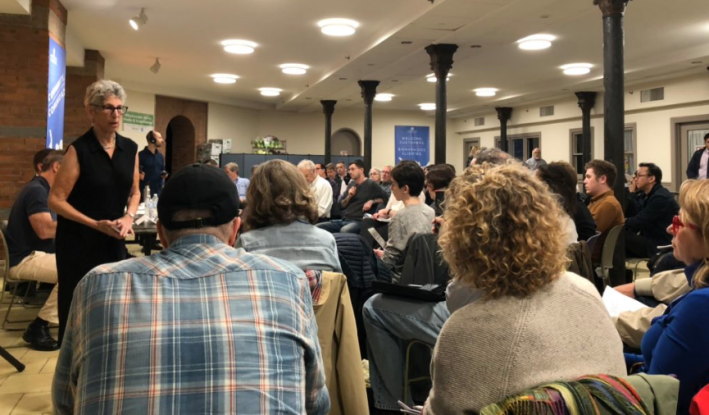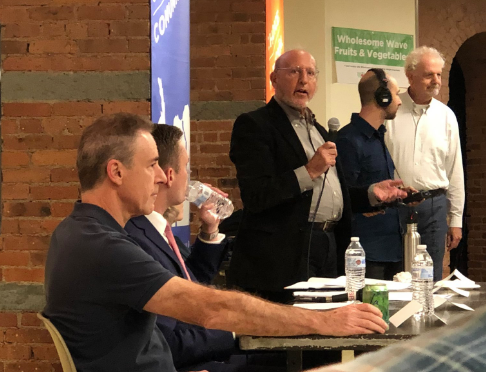Free parking has turned the Upper West Side into a car-choked mess — but car owners flocked to a public meeting to declare, once again, that they are not the problem.
About 100 people packed a panel discussion Tuesday night on “Curbside Space: Optimizing Acres of Public Real Estate,” held by the Transportation Committee of Community Board 7 — many of them car owners. Only about a quarter of Upper West Side households own a vehicle, and even fewer — about 6 percent— use a car to drive themselves to work, but that entitled minority wanted to hear validation of their choice to hog space in the public right of way for car storage.
Instead they learned that they were only one contestant — and the least appropriate one — for a scarce public resource that could be put to better uses.
"If your car is parked, you're part of the problem," declared one panelist, Charles Komanoff, the professor and safe-streets activist who provided the intellectual ballast for what became New York’s congestion-pricing law. "Your parked car is using scarce, valuable curb space that others need. Your car is imposing costs on the community."
The panel was held because, in anticipation of the introduction of congestion pricing below 61st Street in 2021, the CB7 transportation panel drew up a resolution to end free parking on the Upper West Side — with resident parking permits as a possible solution. Declaring that parking for privately owned cars is a “precious commodity” that “exacerbates economic inequality by directing limited city resources to private car owners,” the resolution demanded that the city “discontinue the policy of providing free parking for private cars and consider more productive and equitable uses of curbside space, including, but not limited to: paid residential parking permits, meters capable of surge pricing and the best practices of other major cities.”
Furthering that idea, the panel discussed multiple options for using curbside space, including higher meter rates, surge pricing, residential loading zones, pedestrian improvements, or — most fraught for people in the room — the proposed resident-parking permits. Resident permits, which are common in Boston, Chicago, San Francisco and Los Angeles, have pluses but they also have significant drawbacks. If priced fairly, they can free up curb space by limiting access to residents and raise revenue for the city — but if they're priced too low they can encourage car ownership because suddenly more residents buy cars knowing they have first dibs at a space.

The panelists did not endorse the notion — because New York is so dense that its parking is incredibly valuable. As professor Donald Shoup described in his landmark book "The High Cost of Free Parking," underpricing curb space has led to all kinds of distortions in American land use, resulting in the congested, unlivable, dangerous, fume-choked cities in which we now reside.
Ed Pincar, the Department of Transportation's Manhattan commissioner, said his agency had studied residential-permit programs, ”and we have concerns. I don’t think [residential permit parking] is the silver bullet that some think it is,” he said.
Rachel Weinberger, the senior fellow for transportation policy at the Regional Plan Association, said that, in order for a resident-parking permit scheme to work properly, it would have to charge residents as much as local garage do — and residents probably wouldn't want to pay that much. (A quick look online shows that neighborhood garage prices start at about $250 monthly and can easily run more than $500.) Anything less would yield only an ineffective "hunting license" which wouldn't guarantee anyone a parking space, she said.
Despite the common-sense talk, residents displayed symptoms of parking psychosis — the irrational belief among car owners that the public owes them free car storage in the public right of way. There was loud applause each time someone rose to defend private car storage — as if even discussing the idea of pricing the curb is off limits like a belch at a garden party.
During a question-and-answer period with the panel, several residents excused their car ownership and storage needs because they don’t move their cars much — using them only to “escape the city” on the weekends or to make reverse-commutes out of the city (Metro-North is too expensive, according to one such driver). Another person said he visits children who had been priced out of the neighborhood and now live in outer boroughs.
Generally, car defenders complained that talking about the "value" of parking spaces was an exercise in heartless capitalism that would damage the community — as if private car storage for longtime community members was more of a public purpose than real public purposes, such as bus lanes, or curb extensions, or bike lanes, or parklets.
But many defended reallocation of the curb for public purposes.
“The majority of people in this room are car owners and have a high stake in the status quo,” said neighborhood resident Jody Sperling. "But the majority of neighborhood residents are not car owners. They need to be here. If you weigh the benefits of private individuals storing their fossil-fuel spewing vehicles, there’s better uses for the curb.”
The panel discussed some of those uses: In particular, Pincar described DOT's residential loading zone pilot project, which he said would be expanded in order to accommodate the huge growth in freight deliveries from companies such as Amazon and Fresh Direct.
But Lisa Orman, the director of Streetopia Upper West Side, a neighborhood group that tries to reclaim the public space for public use, told Streetsblog that she was looking for a discussion of the many pedestrian-safety and neighborhood beautification features that public-minded cities put in public space, such as curb extensions, bike corrals, and parklets.
"There are so many uses of the curb that benefit more people," she said.
Residential-parking permits have been discussed before in New York City.
Mayor Bloomberg proposed such a system in 2008 as part of his ill-fated congestion-pricing plan, and the City Council tried to revive the idea in 2011 and as late as last year, as congestion-pricing legislation passed in Albany.
At least one local elected tried to inject some information into the debate: Manhattan Borough President Gale Brewer sent a representative to the forum with a 20-page survey of resident-parking-permit plans in seven cities worldwide. The document didn't take a stand on any one approach, but noted that a 2013 study found that 53 percent of New Yorkers would be willing to pay for a resident-parking permit.
The price they'd be willing to pay? About $408 a year — far below the market value for the Upper West Side.






